5 Ways Amplitude Can Supercharge Your Marketing Team
The best marketing teams use data to drive results. Here are five analyses your team can use to understand user behavior and campaign performance.
Marketing has gone through an evolution in the last few years with the growth of advertising platforms. Ad spend is becoming more expensive and access to data is becoming easier, leading to the rise of a variety of marketing automation tools and marketing analytics software to help marketing teams run more data-driven campaigns.
Ad spend is becoming more expensive and access to data is becoming easier.
But what separates great marketing teams from good marketing teams?
A good marketing team tests copy and images, uses data like pageview, opens and unsubscribes and does UTM tracking to better understand and optimize their campaigns. They optimize for the top of the funnel to drive more views and signups.
A great marketing does all of those things and ALSO leverages product, data, and engineering to transform the customer experience through personalization. They don’t just measure conversion, they understand what drives funnel conversion and retention. Great marketing teams track behavioral metrics over time to improve the ROI of their campaigns.
Great marketing teams track behavioral metrics over time to improve the ROI of their campaigns.
Burger King’s recent “Whopper Detour” campaign is a great example of what’s possible today for great marketing teams that leverage modern product and analytics technologies to create campaigns that drive long term and downstream impact. The campaign unlocked a special Whopper offer for users approaching within 600 feet of McDonalds, led to 1 Million app downloads for Burger King and triggered the highest increase in visits to BK in the past 5 years. Burger King CMO Fernando Machado shared in this behind the scenes article how they used a complete tech stack to pull this off including Amplitude to measure behavior and target messages, Braze to send push notifications, Radar for geofencing, mParticle to send data to all these platforms and Branch for deep linking.
Here are just a few of the many opportunities marketing teams have to use behavioral data to increase the ROI of their campaigns and create real business impact.
With each use case below, we’ll highlight how Marketers can get these deep, behavioral insights with Amplitude. You can also view all these use cases on Amplitude here.
1. Funnel Analysis: Understand the quality of your funnel & the why
Good marketing teams focus on optimizing the top of their funnel and creating habits through discounts to increase LTV, but when they fail to drive results, they don’t know why they fail. Great marketing teams use analytics to understand the bottlenecks in their funnel and to understand WHY certain groups of new users are converting and why others are dropping off.
Great marketing teams use analytics to understand the bottlenecks in their funnel.
This allows great marketing team to realize that sometimes the bottleneck is the product and they can’t create a habit because users don’t have an easy way to take a certain action. For example, an e-commerce marketing team tries to create repeat purchasers by giving away discounts to increase LTV but they can’t create a habit. Through product analytics, they discover that the bottleneck is there’s no easy way to create a repeat order. They then test their assumption by emailing the last order to users and using the data to influence the product team to improve the customer experience, making future campaigns more effective.
Amplitude: Event Segmentation, Funnel Analysis Compare Behaviors, Retention, Cohorts
View an actual example on Amplitude here
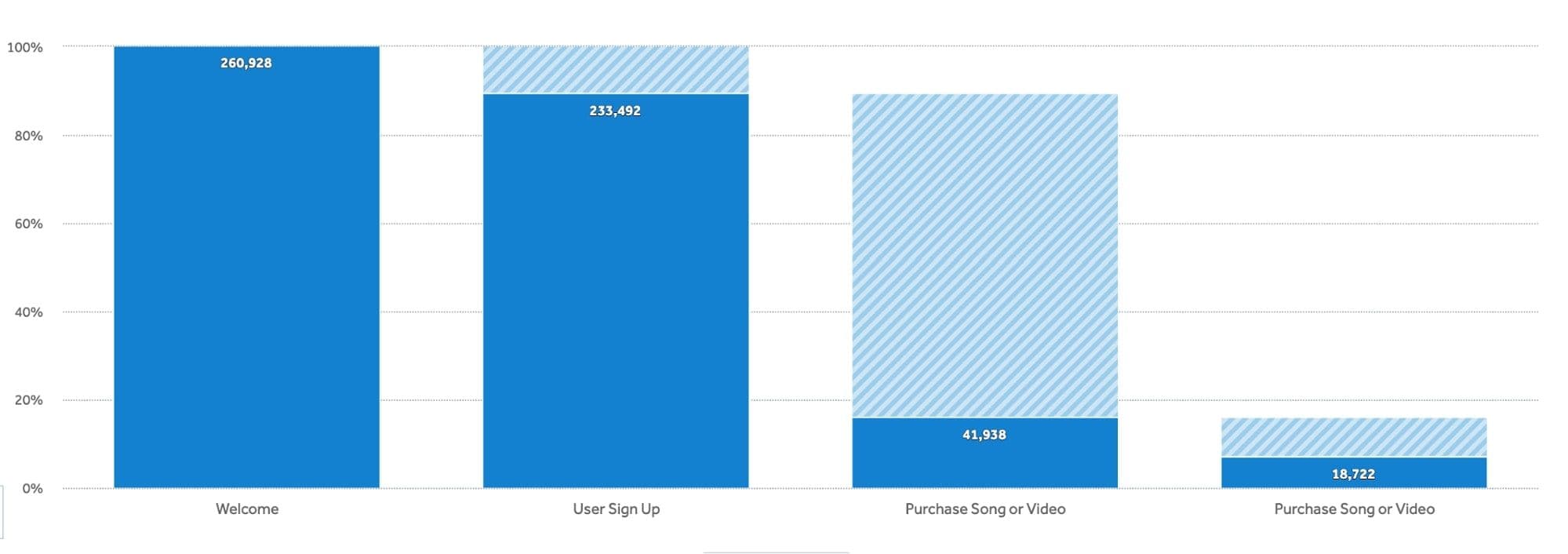
2. User Acquisition: Deep behavioral attribution that links to LTV
While good marketing teams use web attribution to understand which channels have converted best, great marketing teams not only look at which channels led to new users but also go a step deeper by asking themselves which channel brought in users who ended up sticking around and retaining long-term, bringing in maximum LTV for the company.
Amplitude: Funnel Analysis Group By, Retention, Stickiness
Integrations: Appsflyer, Adjust, Branch
View an actual example on Amplitude here
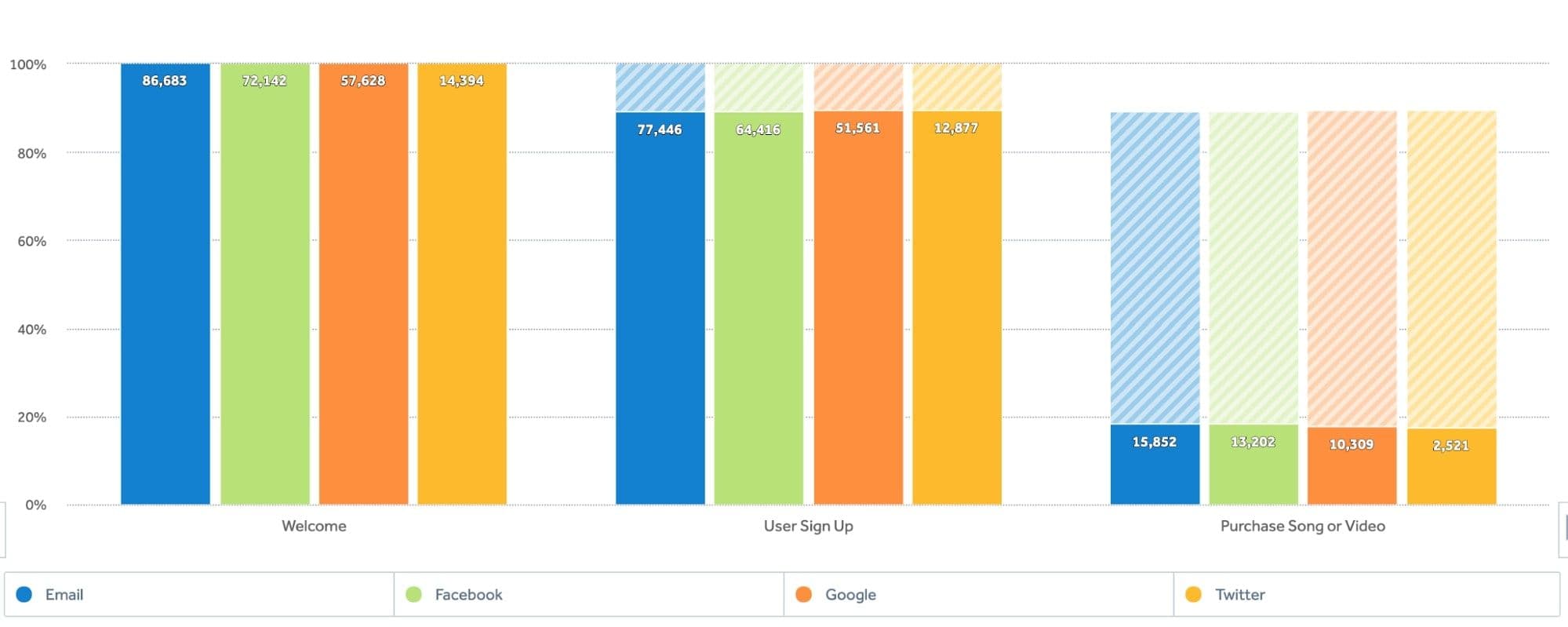
3. User Acquisition: With cohorts, create lookalike acquisition campaigns based on your own data
While good marketing teams will leverage Facebook’s powerful targeting and lookalike audiences based on clicks/signups, great marketing teams use Amplitude to discover power users acquired through campaigns and export these users through cohorts to their marketing tools like Facebook lookalike audiences to optimize their ad spend.
Great marketing teams use Amplitude to discover power users.
Amplitude: Cohort-Sync, Funnel Analysis, Retention, Stickiness
Integrations: Facebook Ads
View an actual example on Amplitude here
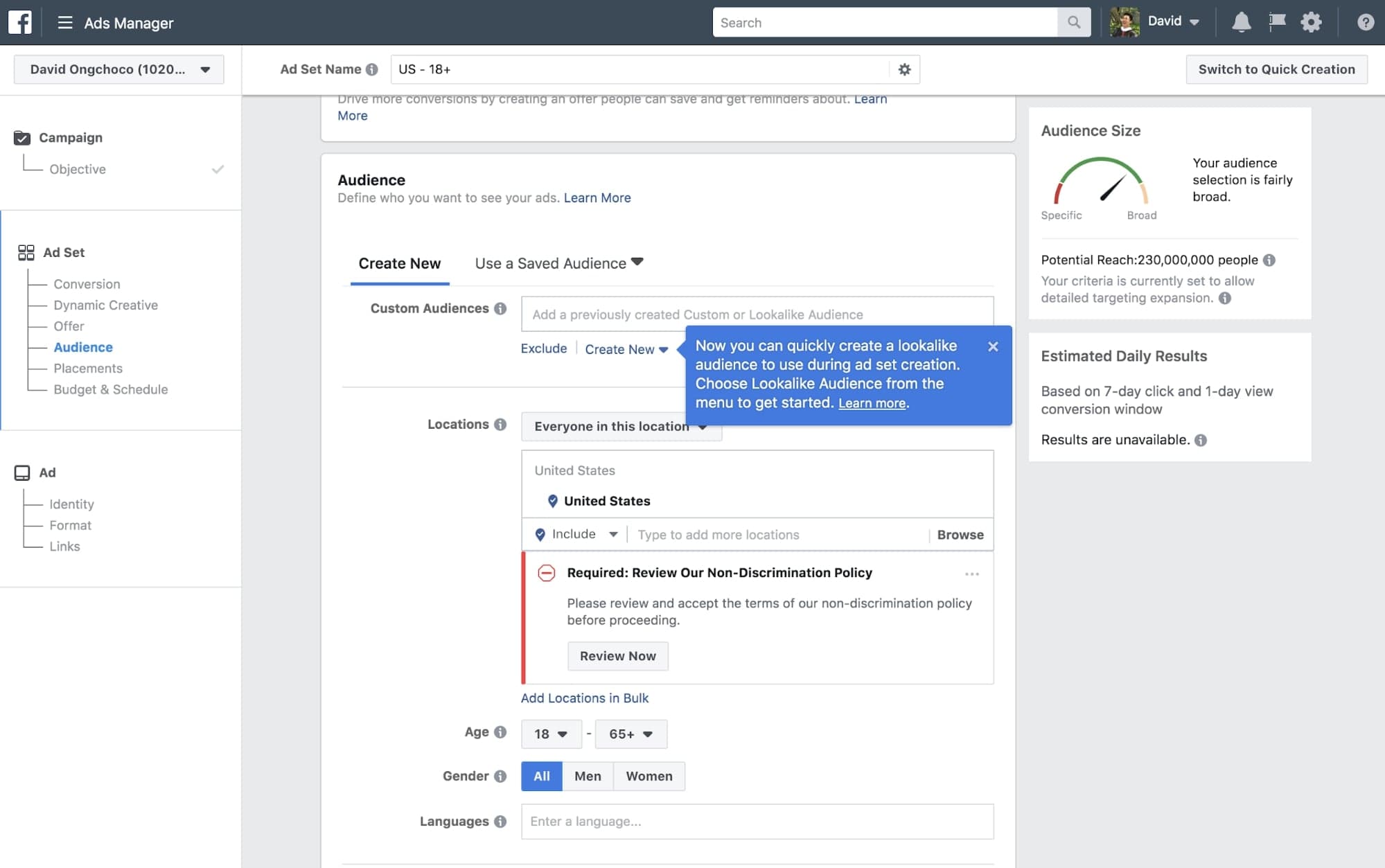
4. Run lifecycle engagement campaigns triggered by behavioral cohorts
While good marketing teams run lifecycle engagement campaigns to re-engage active and inactive users based on user properties like age and location, great marketing teams use Amplitude to target users based on not only user properties but key actions they’ve taken in the product.
Great marketing teams use Amplitude to target users by key actions they’ve taken in the product.
For example, a company can send a push notification through Braze (or another marketing engagement tool) to message users who signed up for your app in the past hour but left before taking a key action (playing a song or making their first post, for example). Using Amplitude + a marketing engagement tool, great marketers can create a cohort in Amplitude and have that specific group of users automatically receive an email or push notification prompting them to play that first song or create that first post.
Amplitude: Cohort-Sync, Event Segmentation, Funnel Analysis, Cohorts
Integrations: Braze, Iterable, Urban Airship
Image taken from the Braze website
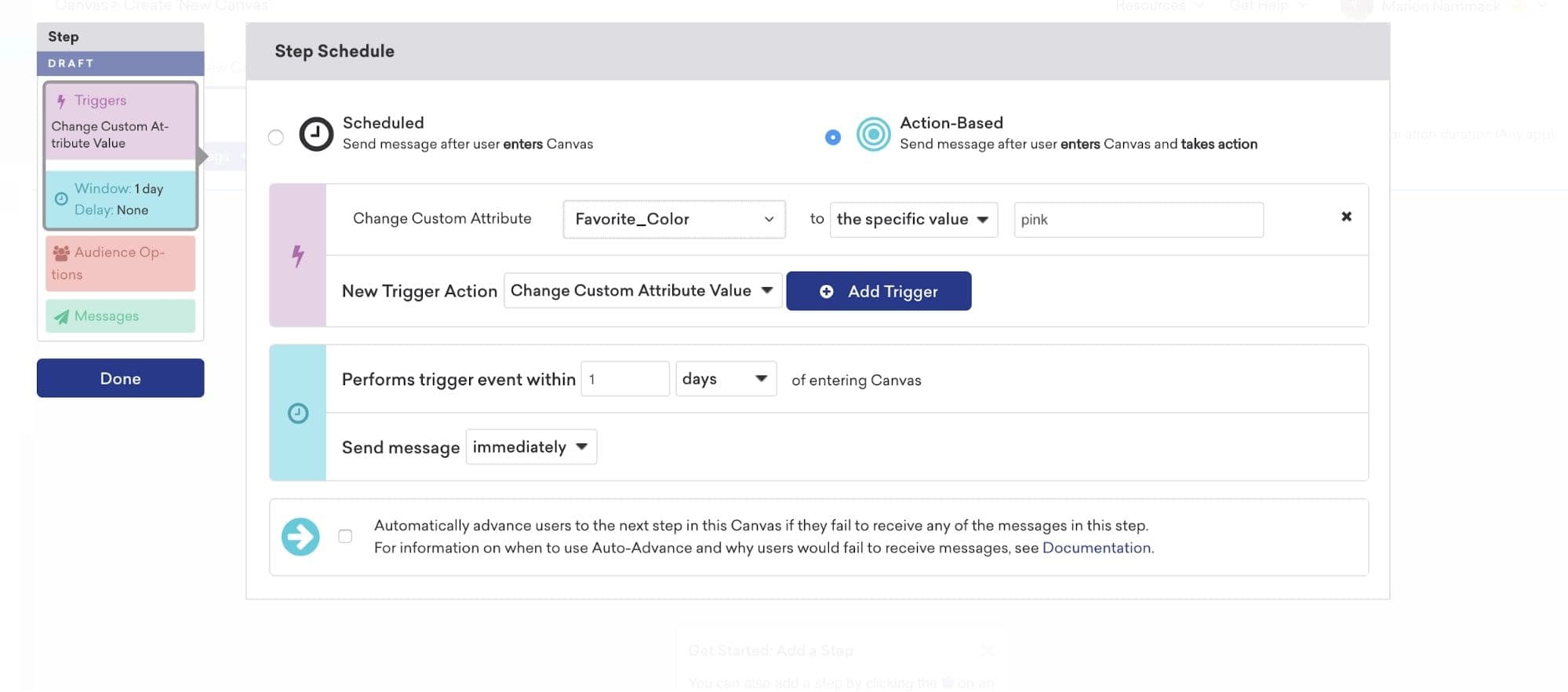
View an actual example on Amplitude here
5. A/B Testing: Analyze performance of your tests & campaigns
Whether it’s an acquisition, lifecycle, or engagement campaign; Amplitude allows growth marketers to easily run A/B tests to see the impact of their campaigns against a control group or to compare different versions of a campaign. Amplitude’s funnel analysis helps marketers know whether the impact of their test is statistically significant and allows marketers to quickly look into how an experimental campaign may impact not only the conversion of a group of users but also their stickiness and retention.
Amplitude: Funnel Analysis, Event Segmentation, Retention, Stickiness
Integrations: Optimizely, Apptimize
View an actual example on Amplitude here
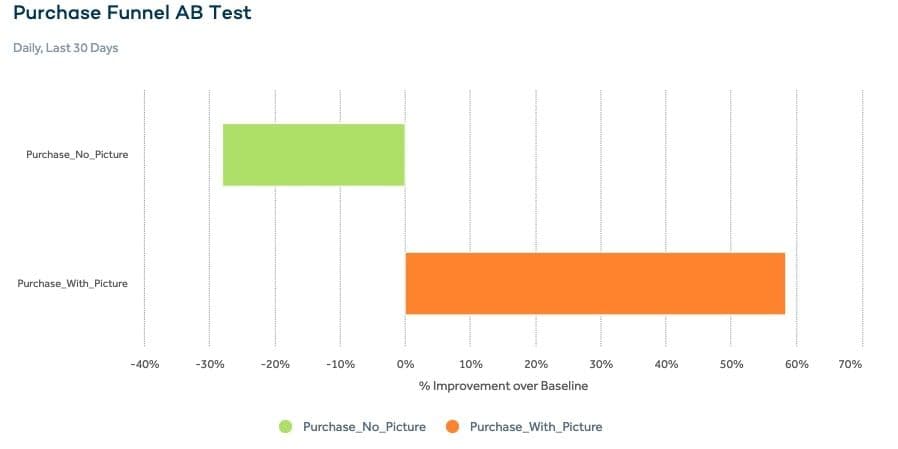

David Ongchoco
Former Growth Analyst, Amplitude
David is a former Growth Analyst at Amplitude where he focused on building scalable programs to help customers build better products. Previously, David ran an international nonprofit called YouthHack, spent some time in venture capital working with early stage companies and wrote about startups for publications like the Huffington Post & Inc. Magazine.
More from David




